- Home
- W. Somerset Maugham
Then and Now Page 2
Then and Now Read online
Page 2
In June of the year with which this narrative is concerned Arezzo, a city subject to Florence, revolted and declared itself independent. Vitellozzo Vitelli, the ablest of Il Valentino's commanders and bitter enemy of the Florentines because they had executed his brother Paolo, and Baglioni, Lord of Perugia, went to the support of the rebellious citizens and defeated the forces of the Republic. Only the citadel held out. The Signory in a panic sent Piero Soderini to Milan to hasten the expedition of the four hundred lancers King Louis had promised them. Piero Soderini was an influential citizen and as Gonfalonier occupied the position of president of the Republic. They ordered their own troops encamped before Pisa, which they had long been trying to subdue, to advance to the rescue, but before they arrived the citadel fell. At this juncture Il Valentino, who was at Urbino which he had recently conquered, sent the Sig-nory a peremptory demand for the dispatch of an ambassador to confer with him. They sent the Bishop of Volterra, Piero Soderini's brother, and Machiavelli accompanied him as his secretary. The crisis was resolved, for the French King sent a strong force to fulfil his obligation towards Florence, and Cæsar Borgia, yielding to the threat, recalled his captains.
But his captains were themselves lords of petty states, and they could not but fear that when they had served his purpose he would crush them as ruthlessly as he had crushed other lords of other states. They received information that he had made a secret arrangement with Louis XII by the terms of which the King was to provide a contingent to assist him first in the capture of Bologna and then in the destruction of the captains, whose territories it would be convenient for him to incorporate in his own dominions. After some preliminary discussion they met at a place called La Magione, near Perugia, to consider how best to protect themselves. Vitellozzo, who was ill, was carried to the meeting on a litter. Pagolo Orsini came accompanied by his brother the Cardinal and his nephew the Duke of Gravina. Among others who attended were Ermek Bentivoglio, the son of the Lord of Bologna, two Baglionis from Perugia, the young Oliverotto da Fermo, and Antonio da Venafro, the right-hand man of Pandolfo Petrucci, Lord of Siena. Their danger was great and they agreed that for their own safety they must act, but the Duke was a dangerous man and they knew that they must act with prudence. They decided for the present not to break with him openly, but to make preparations in secret and attack only when they were ready. They had in their pay a considerable body of troops, horse and foot, and Vitelloz-zo's artillery was powerful; they sent emissaries to hire several thousand of the mercenaries that then swarmed in Italy, and at the same time agents to Florence to ask for aid, for the Borgia's ambition was as great a threat to the Republic as to them.
It was not long before Caesar heard of the conspiracy, and on his side he summoned the Signory to provide him with the troops which he declared they had engaged to let him have in case of need and requested them to send him an envoy empowered to treat with him. This was how it came about that Machiavelli was on his way to Imola. He went with misgiving. The Signory had dispatched him because he was a man of no official consequence, with no authority to make an agreement, who could only refer back to Florence and at every step must await his government's instructions. It was invidious to send such an emissary to one who, though a bastard of the Pope, in official documents styled himself Duke of Romagna, Valencia and Urbino, Prince of Andria, Lord of Piombino, Gonfalonier and Captain-General of the Church. Machiavelli's instructions were to inform him that the Signory had refused the conspirators' request for help, but that if he wanted either men or money he must apprise the Signory and await their reply. His business was to temporize, for such was the consistent policy of the Republic. The Signory could always find excellent reasons for doing nothing. If they got into too tight a corner they would untie the strings of their money-bags and disburse as small a sum as was acceptable. His business was to allay the impatience of a man unused to procrastination, to make no promises that had substance, to cajole a suspicious man with specious words, to use craft against craft, to counter deceit with deceit, and to discover the secrets of one who was notorious for his dissimulation.
Although he had but-briefly seen him at Urbino, Machiavelli had been deeply impressed by him. He had heard there how the Duke Guidobaldo di Montefeltro, confiding in Cæsar Borgia's friendship, had lost his state and barely escaped with his life; and though he recognized that Il Valentino had acted with shocking perfidy he could not but admire the energy and adroit planning with which he had conducted the enterprise. This was a man of parts, fearless, unscrupulous, ruthless and intelligent, not only a brilliant general but a capable organizer and an astute politician. A sarcastic smile played upon Machiavelli's thin lips and his eyes gleamed, for the prospect of matching his wits with such an antagonist excited him, He began in consequence to feel much better and was no longer conscious of his queasy stomach; he was able indeed to look forward without displeasure to eating a snack at Scarperia, which was about half-way between Florence and Imola, and where he had decided to hire post horses. They had ridden as fast as was reasonable, for he wanted to get to Imola that day, and the horses, carrying not only their riders, but a good deal of baggage as well, could hardly be expected without hurt to themselves to go so far without more rest than he could afford to give them. He proposed to go on with Piero, leaving the two servants to follow next day with his own horse and Piero's pony.
They stopped at the Albergo della Posta and Machia-velli, dismounting, was glad to stretch his legs. He enquired what food could be prepared without delay and was not dissatisfied when he learnt that he could have macaroni, a dish of small birds, sausage from Bologna and a pork chop. He was a good trencherman and he devoured the meal that was set before him with enjoyment. He drank the strong red wine of the country and felt all the better for it. Piero ate as copiously as his master, and when they got into the saddle again and set out, he felt good and happy, so happy indeed that he began to hum one of the popular songs that ran about the streets of Florence. Machiavelli pricked up his ears.
'Why, Piero, your uncle never told me you had a voice.'
Piero let it out with complacency and sang an ascending scale.
'A pretty tenor,' Machiavelli said with a warm and friendly smile.
He reined in his horse to a walk, and Piero, accepting this as an invitation, broke into a well-known air, but the words were some that Machiavelli had written himself. He was pleased, but did not fail to reflect that the boy sang them to ingratiate himself with him. It was a neat device and he did not disapprove of it.
'How did you learn those words?'
'Uncle Biagio wrote them out for me and they fitted the tune.'
Machiavelli made no reply and broke again into a canter. It occurred to him that it would be worth while to find out what he could about this boy whom he had taken, certainly, to oblige his friend Biagio, but whom also he had the intention of making good use of; so during the rest of the journey, when hilly country obliged them to walk the horses, he set out to do this. No one could be more affable, interesting and amusing than he when he chose, nor so subtle, and Piero would have had to be more worldly-wise than at his age he could be to discover that the friendly, careless questions put to him were designed to make him discover himself naked as when he was born. Piero was neither shy nor self-conscious, he had indeed the assurance of youth, and he answered frankly and ingenuously. To talk about himself seemed a very pleasant way of passing time that was beginning to grow tedious. Marsilio Ficino, the famous old scholar, had died only three years before; he was Biagio's father-in-law and had directed the young boy's studies. It was on his advice that Piero had acquired a sound knowledge of Latin and though against his will a smattering of Greek.
'It is one of the misfortunes of my life that I never learnt it,' said Machiavelli. 'I envy you for having read the Greek authors in the original.'
'What good will that do me?'
'It will teach you that happiness is the good at which all men aim, and that in order to attain it you need
nothing but good birth, good friends, good luck, health, wealth, beauty, strength, fame, honour and virtue.'
Piero burst out laughing.
'It will also teach you that life is uncertain and full of tribulation, from which you may conclude that it is only reasonable to snatch what pleasure you can while you are of an age to enjoy it.'
'I didn't need to learn the tenses of Greek verbs to know that,' said Piero.
'Perhaps not, but it is reassuring to have good authority for following one's natural inclinations.'
By well-directed questions Machiavelli learnt who the boy's friends were in Florence and what life he had led there, and by flattering attention to the opinions on one subject and another that he inveigled him into pronouncing he gained presently a fair impression of Piero's capacity and character. He was inexperienced, of course, but quick-witted, more so than his Uncle Biagio, who, though good and honest, was of mediocre intelligence; he had the high spirits of his youth, a natural wish to enjoy himself, and an adventurous temper; though ingenuous and in a way simple, he was not over-scrupulous, a trait to Machiavelli's mind of no disadvantage, for it meant that he would not be hindered by a too delicate conscience if he were wanted to do something that was a trifle less than honourable; he was strong and active and there was no reason to suppose that he lacked courage; his open face, his air of frankness, his engaging manner might all turn out to be valuable assets; it remained to discover whether he knew how to keep his own counsel and whether he could be trusted. It required only a little time to find out the first, and as to the second Machiavelli had no intention of trusting him or anyone else more than need be. In any case the boy was clever enough to know that it could only be to his benefit to gain the good opinion of his master. A good word from Machiavelli could assure his future; a bad report would entail his dismissal from the service of the Republic.
5
They were nearing Imola. It was situated on a river in a fertile plain, and the surrounding country showed none of the ravages of war, since it had capitulated on the approach of Caesar's forces. When they were about two miles away they met seven or eight horsemen and Machiavelli recognized among them Agapito da Amalia, the Duke's first secretary, whose acquaintance he had made at Urbino. He greeted Machiavelli warmly, and on learning the errand on which he was found, turned back and accompanied him to the city. The Signory had sent a courier a day before to inform their agent at the Duke's court of their envoy's arrival and the courier was waiting for him at the city gate. It had been a long ride and Agapito asked Machiavelli whether he would not like to refresh himself and rest before presenting his credentials to the Duke. Though the army was encamped outside the walls, the small city, now Il Valentino's capital, was crowded with his personal staff, the members of his court, agents of other Italian states, merchants with necessities or luxuries to sell, solicitors of favours, sycophants, spies, actors, poets, loose women, and all the rag tag and bobtail that followed a victorious condottiere in the hope of making money by fair means or foul. The result was that lodging was hard to get. The city's two or three inns were chock-a-block and men were sleeping three, four and five in a bed. But the Florentine agent had made arrangements for Machiavelli and his servants to be put up in the Dominican monastery and it was thither that the courier now suggested conducting him. Machiavelli turned to Agapito.
'If His Excellency can receive me I should prefer to see him at once,' he said.
'I will ride on and find out if he is at liberty. This officer will lead you to the Palace.'
Leaving the man he had indicated behind, Agapito trotted off with the rest of his party. The others walked their horses through the narrow streets till they came to the main square. On the way Machiavelli asked the officer which was the city's best inn.
'I don't fancy the fare those good monks of the monastery will provide and I have no wish to go supperless to bed.'
'The Golden Lion.'
Machiavelli addressed himself to the courier.
'When you have deposited me at the Palace go to the Golden Lion and see that an ample meal is prepared for me.' Then to Piero: 'Attend to the stabling of the horses. The courier will show you the way to the monastery and you will leave the saddle-bags in charge of Antonio.' This was one of his two servants. 'Then you and the courier will come to the Palace and wait for me.'
The Palace, a large, but unpretentious building, for Caterina Sforza who had built it was a thrifty woman, took up one end of the square, and here Machiavelli and the officer, dismounting, were admitted by the guard. The officer sent a soldier to tell the first secretary they were there. In a few minutes he came into the room in which Machiavelli was waiting. Agapito da Amalia was a swarthy man, with long black hair and a small black beard, with a pale skin and sombre, clever eyes. He was a gentleman, with good manners, suave of speech and with a candid air which deceived many into thinking less of his abilities than was wise. He was devoted both to the person and the interest of the Duke, for Il Valentino had the gift of attaching to himself those whose loyalty was necessary to him. He told Machiavelli that the Duke would receive him at once. They ascended a fine flight of stairs and Machiavelli was ushered into a handsome apartment, the walls painted in fresco, with a large stone fireplace on the hood of which were carved the arms of the intrepid, but unfortunate Caterina Sforza whom Caesar Borgia now held prisoner in Rome. A bright fire of logs blazed on the hearth, and the Duke stood with his back to it. The only other person in the room was Juan Borgia, Cardinal of Monreale, the portly, shrewd nephew of Pope Alexander. He was seated in a carved, high-backed chair toasting his toes at the fire.
Machiavelli bowed to the Duke and the Cardinal, and the Duke, coming towards him graciously, took his hand and led him to a chair.
'You must be cold and tired after your long journey, Secretary,' he said. 'Have you eaten?'
'Yes, your Excellency, I ate on the way. I offer you my apologies for presenting myself as I am, in my riding clothes, but I did not wish to delay telling you what I have to say on behalf of the Republic'
He then presented his letter of audience. The Duke gave it a brief glance and handed it to the Secretary. Caesar Borgia was a man of striking beauty, of more than common height, with broad shoulders, a powerful chest and a slim waist. He was dressed in black, which emphasized his vivid colouring, and besides a ring on the index finger of his right hand, his only ornament was the collar of St. Michael, the order which King Louis had conferred upon him. His hair, of a rich auburn and carefully dressed, was worn long and reached his shoulders; he had a moustache and a short beard trimmed to a point. His nose was straight and delicate and his eyes, under well-marked brows, were fine and bold; his well-shaped mouth was sensual; his skin clear and glowing. His gait was stately, yet graceful, and in his bearing was something of majesty. Machiavelli asked himself how it came about that this young man, the offspring of a Roman woman of the people and a fat, hook-nosed Spanish priest who had bought the papacy by shameless simony, had acquired the demeanour of a great prince.
'I requested your government to send me an envoy because I wish to know exactly how I stand with the Republic,' he said with deliberation.
Machiavelli delivered the discourse he had prepared, but though the Duke listened Machiavelli could not but see that he looked upon the assurances of good will to which on the Signory's instructions he gave utterance as no more than fine phrases. There was a moment's silence. The Duke leant back in his chair and with his left hand fingered the order on his breast. When he spoke it was with a certain coolness.
'My dominions border upon yours along an extended frontier. I am bound to take every means in my power to safeguard them. I know only too well that your city is ill-disposed to me. You have tried to embroil me with the Pope and the King of France. You couldn't have treated me worse if I were a murderer. Now you must choose whether you will have me as a friend or as an enemy.'
His voice was musical, light rather than deep, and it had a quality, not acid, but c
utting, which gave his words an insolence which was not easy to bear. He might have been speaking to a scullion. But Machiavelli was a practised diplomatist and knew how to keep his temper.
'I can assure Your Excellency that there is nothing my government wants more than your friendship,' he answered blandly, 'but they have not forgotten that you allowed Vitellozzo to invade our territories and they are doubtful of its value.'
'I had nothing to do with that. Vitellozzo acted on his own account.'
'He was in your pay and under your command.'
'The expedition was begun without my knowledge and continued without my aid. I will not pretend I regretted it. I didn't. The Florentines had broken faith with me and it was right that they should suffer for it. But when I thought they had been sufficiently punished I ordered my captains to withdraw. It has won me their enmity and they are now conspiring my overthrow.'
Machiavelli did not think it the moment to remind the Duke that he had recalled his commanders only on the peremptory command of the King of France.
'You are to blame for that, just as you are to blame for Vitellozzo's invasion of your territory.'
'We?' cried Machiavelli in frank astonishment.
'Nothing of this would have happened if you hadn't been such fools as to torture and execute Paolo Vitelli. You can hardly be surprised that his brother Vitellozzo should seek his revenge, and because I prevented him from pursuing it to the end he has turned against me.'
It is necessary to explain what the Duke meant by this.

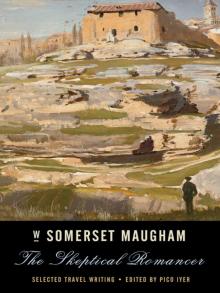 The Skeptical Romancer: Selected Travel Writing
The Skeptical Romancer: Selected Travel Writing The Summing Up
The Summing Up Up at the Villa
Up at the Villa The Razor's Edge
The Razor's Edge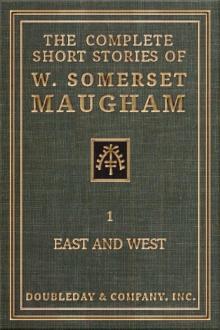 The Complete Short Stories of W. Somerset Maugham: East and West (Vol. 1 of 2))
The Complete Short Stories of W. Somerset Maugham: East and West (Vol. 1 of 2))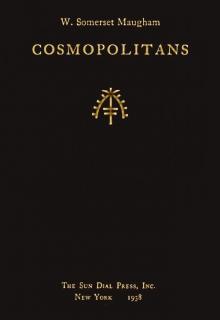 Cosmopolitans
Cosmopolitans 65 Short Stories
65 Short Stories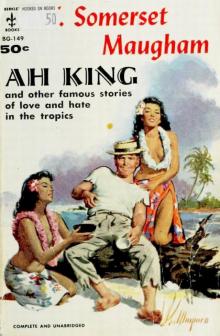 Ah King (Works of W. Somerset Maugham)
Ah King (Works of W. Somerset Maugham) Collected Short Stories: Volume 1
Collected Short Stories: Volume 1 Collected Short Stories Volume 2
Collected Short Stories Volume 2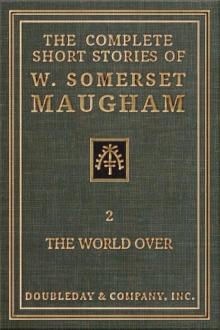 The Complete Short Stories of W. Somerset Maugham - II - The World Over
The Complete Short Stories of W. Somerset Maugham - II - The World Over Collected Short Stories Volume 4
Collected Short Stories Volume 4 Theatre
Theatre Short Stories
Short Stories Then and Now
Then and Now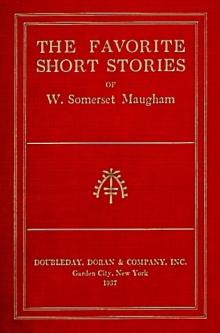 The Favorite Short Stories of W. Somerset Maugham
The Favorite Short Stories of W. Somerset Maugham Of Human Bondage
Of Human Bondage The Magician
The Magician The Great Exotic Novels and Short Stories of Somerset Maugham
The Great Exotic Novels and Short Stories of Somerset Maugham A Writer's Notebook
A Writer's Notebook Christmas Holiday
Christmas Holiday The Making of a Saint
The Making of a Saint Merry Go Round
Merry Go Round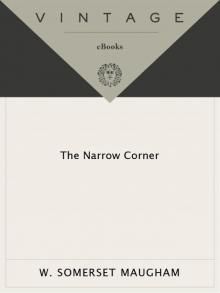 The Narrow Corner
The Narrow Corner Collected Short Stories Volume 3
Collected Short Stories Volume 3 Ten Novels and Their Authors
Ten Novels and Their Authors Ashenden
Ashenden The Moon and Sixpence
The Moon and Sixpence Cakes and Ale
Cakes and Ale Liza of Lambeth
Liza of Lambeth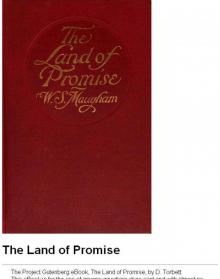 The Land of Promise: A Comedy in Four Acts (1922)
The Land of Promise: A Comedy in Four Acts (1922) A Writer's Notebook (Vintage International)
A Writer's Notebook (Vintage International)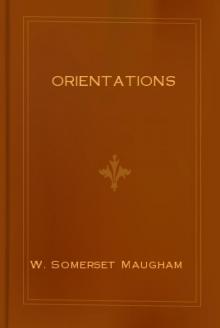 Orientations
Orientations Selected Masterpieces
Selected Masterpieces Mrs Craddock
Mrs Craddock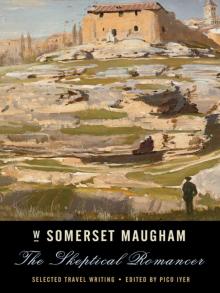 The Skeptical Romancer
The Skeptical Romancer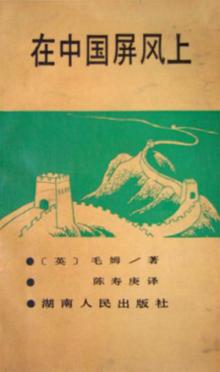 On a Chinese Screen
On a Chinese Screen (1941) Up at the Villa
(1941) Up at the Villa The Great Novels and Short Stories of Somerset Maugham
The Great Novels and Short Stories of Somerset Maugham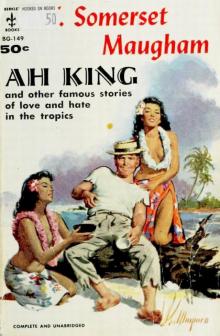 Ah King
Ah King The Explorer
The Explorer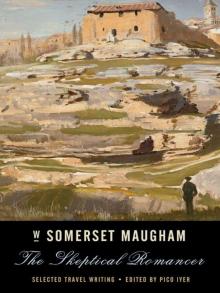 The Skeptical Romancer: Selected Travel Writing (Vintage Departures)
The Skeptical Romancer: Selected Travel Writing (Vintage Departures)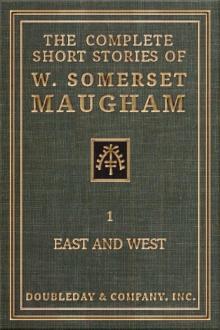 The Complete Short Stories of W. Somerset Maugham - I - East and West
The Complete Short Stories of W. Somerset Maugham - I - East and West